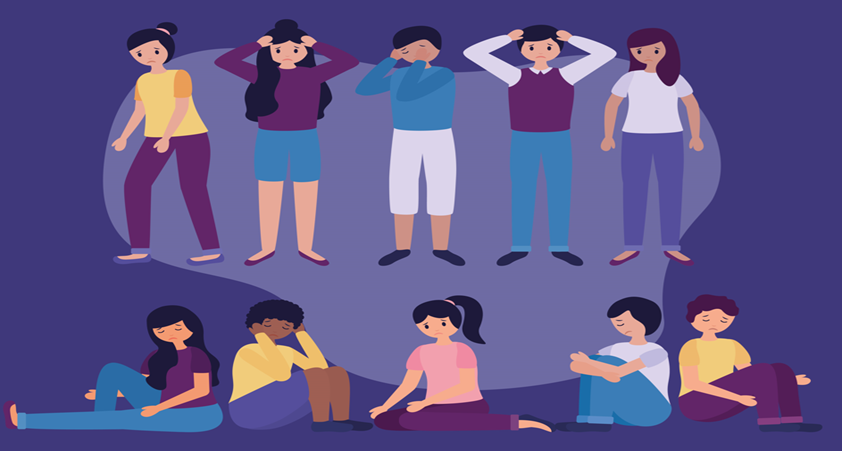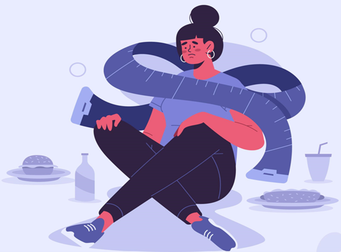|
Written by Kimberly Osborn, M.S.W. - Lab Manager This blog post is targeted toward individuals struggling with eating disorders and their loved ones. Although it is a part of human nature to compare ourselves and to even try to outperform other people, especially in things that are important to us, Western culture often encourages and reinforces harmful and disruptive forms of comparison and competition. We are often inundated with societal and interpersonal messages that encourage us to push ourselves to extremes, whether that is extreme productivity, extreme standards for success, or even extreme health and weight-related behaviors. We are also repeatedly told that our success and self-worth depend on how well we perform compared to others, and this is reinforced throughout our lives at school and work, in relationships, and even within ourselves. Considering this, it is unsurprising that many of us struggle with social comparison or feel the need to prove our worth by competing with others in life domains that are important to us, such as academics, work, relationships, physical appearance, etc. Comparison and competition can be helpful in some circumstances such as helping us recognize areas in our lives where we would like to improve or by offering examples about how to perform better in domains that are important to us. However, when our self-worth is based on where we stand within a particular social ranking, especially one that is wholly dependent on achievement or other factors outside of our control, it can impact our relationships with other people and even ourselves (1). When comparison and competitiveness are core components of a relationship, they often become less genuine and can even cause harm to us and those we care about. These dynamics can also make us feel worse about ourselves and our abilities and cause us to engage in behaviors that are unhealthy for us. Trying to “prove” we are worthy by pushing past our own limits in order to outperform other people often leads to frustration, feelings of unworthiness, and even burnout. While there is a lot of variety in the ways people compare and compete with others, health-related behaviors, weight or shape, and food intake seem to be particularly common areas of comparison and competition in our culture (2). Unfortunately, we live in a fat-phobic society where thinness is glorified and obsessive efforts to achieve these ideals are reinforced throughout our lives. It is unsurprising, therefore, that many people engage in direct comparison and competition about what they eat and how they move their bodies to determine their self-worth and relative social standing (3). These dynamics are certainly harmful to everyone by contributing to unhealthy and disruptive patterns of relating to others and ourselves, but they can be especially harmful to individuals struggling with eating disorders (EDs; 3) Body- and food- related comparisons can negatively impact the way individuals suffering from EDs view themselves, their illness, and even their recovery. People with lived experience of EDs often report feeling “not sick enough” compared to other people with EDs, and this can lead to feelings of shame and frustration, as well as a reluctance to seek help (4). For some people, this can result in attempts to become “sickest” by losing more weight or by increasing the number or severity of ED behaviors. Although not all people with EDs struggle with these interpersonal dynamics, there are many environments where they do occur, especially in spaces where people with disordered eating or EDs come together, both online and offline. For example, research suggests online ED communities (including both recovery-oriented and pro-ED spaces) can become competitive (5). Explicit examples of these types of interactions include overt competitions related to weight loss or the number of calories eaten, which are often observed in spaces where recovery is not considered a priority, such as pro-ED sites. However, this dynamic often occurs much more subtly, especially in spaces that endorse explicit orientations toward recovery, such as ED recovery accounts on social media and among peers receiving ED treatment. On the surface, these spaces often appear to be wholly supportive of recovery and free from the types of competitive attitudes and behaviors seen in other ED spaces. Yet, there are several indications that individuals may be attempting to gauge their social standing within these communities based on current or previous illness ED severity. Examples include:
People with EDs report that comparison based on shape or weight, ED behaviors, or illness severity can result in a felt need to engage in more extreme weight loss attempts or ED behaviors to ensure their illness is at least as “severe” as their peers, possibly as a way to reduce fears or concerns about the validity of their ED (6). The use of extreme ED behaviors and medical consequences can be viewed as ways to increase one’s social standing among others with EDs, even when these dynamics are not explicit or not fully conscious to the individual. Often, people struggling with EDs report desires not only to be as sick as their peers but sometimes express desires and attempts to be thinner or “sicker” than others. This may be the result of fearing they are failing in their ED, and subsequently failing as a person, if they do not demonstrate the highest levels of self-control or the most discipline in their self-imposed and increasingly rigid food and body rules. Shame and embarrassment frequently accompany these feelings and behaviors as many people with EDs deeply care about others and may not be naturally inclined to compare and compete with others. If you are someone with a current or past ED and have experienced thoughts or feelings related to these topics, it is important to remember you are not alone, and it doesn’t make you a bad person. It is human nature to compare ourselves with others and it is normal to want to be considered valuable and respected by others. Unfortunately, EDs tend to overshadow other, more important, aspects of ourselves, including our values, hobbies, and other things that positively influence the way we think about ourselves and the world around us. As a result, an ED diagnosis or ED behaviors often come to feel like the most important part of who we are and even lead us to base our identity and self-worth almost entirely on how “successful” we are at losing weight or engaging in ED behaviors. And as we discussed before, humans naturally look to others to determine how we are performing within a certain domain, so comparisons and competitive attitudes with other ED sufferers make intuitive sense, although these dynamics can be extremely detrimental to us and those around us, which begs the question: What can we do about it?
Extra Resources on Comparison and Competitiveness Psychology Today: The Best Anorexic https://www.psychologytoday.com/us/blog/starving-the-banquet/201109/the-best-anorexic Why do we Compare Ourselves to Others?: The Emily Program https://emilyprogram.com/blog/why-do-we-compare-ourselves-to-others/ References
2 Comments
|
Archives
January 2024
Categories |
- About
- People
- Our Research & Publications
-
Participate in Research
- Personalized Interventions and Outcomes: Navigating Eating Disorder Experiences and Recovery (PIONEER) Study (Online)
- Youth Eating Study (YES!)
- Tracking Restriction, Affect and Cognitions (TRAC) Study (Online)
- Virtual Reality Study
- Facing Eating Disorder Fears Study (Online)
- Personalized Treatment and CBT-E Study (Online)
- Body Project Summer Camp
- The Body Project
- Clinical Screener Study (Online)
- Clinic, Supervision, and Consultation
- Blog & In the Press
-
Archived Studies
- Predicting Recovery Study (Online)
- Online Single Session Resources
- Reconnecting to Internal Sensations and Experiences (RISE) Study
- Web-Based Mindfulness Study
- Personalized Treatment Study
- Online Imaginal Exposure Study
- In-Vivo Imaginal Exposure Study
- Daily Habits 3 Study
- Daily Mood Study
- COVID-19 Daily Impact Study
- Conquering fear foods study
- Louisville Pregnancy Study
- Approach and Avoidance in AN (AAA) Study
- Web-Based Mindfulness for AN & BN Study
- Barriers to Treatment Access (BTA) Study!
- Mindful Self-Compassion Study
- Network EMA Study
- Legacy of Hope Summit Report
- DONATE-CURE EATING DISORDERS!
- Directions
- Statistical Consultation
- About
- People
- Our Research & Publications
-
Participate in Research
- Personalized Interventions and Outcomes: Navigating Eating Disorder Experiences and Recovery (PIONEER) Study (Online)
- Youth Eating Study (YES!)
- Tracking Restriction, Affect and Cognitions (TRAC) Study (Online)
- Virtual Reality Study
- Facing Eating Disorder Fears Study (Online)
- Personalized Treatment and CBT-E Study (Online)
- Body Project Summer Camp
- The Body Project
- Clinical Screener Study (Online)
- Clinic, Supervision, and Consultation
- Blog & In the Press
-
Archived Studies
- Predicting Recovery Study (Online)
- Online Single Session Resources
- Reconnecting to Internal Sensations and Experiences (RISE) Study
- Web-Based Mindfulness Study
- Personalized Treatment Study
- Online Imaginal Exposure Study
- In-Vivo Imaginal Exposure Study
- Daily Habits 3 Study
- Daily Mood Study
- COVID-19 Daily Impact Study
- Conquering fear foods study
- Louisville Pregnancy Study
- Approach and Avoidance in AN (AAA) Study
- Web-Based Mindfulness for AN & BN Study
- Barriers to Treatment Access (BTA) Study!
- Mindful Self-Compassion Study
- Network EMA Study
- Legacy of Hope Summit Report
- DONATE-CURE EATING DISORDERS!
- Directions
- Statistical Consultation




 RSS Feed
RSS Feed
